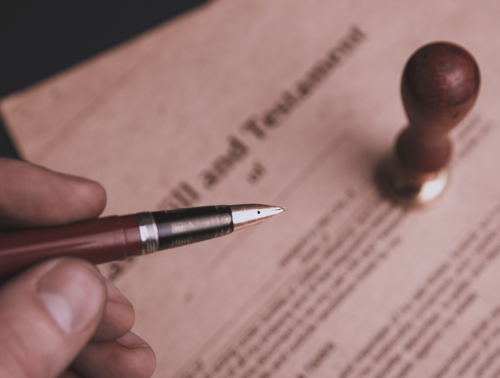
What is an executor and how are they appointed?
An executor is the person named in your Will to administer your estate and distribute it according to the instructions given in your Will. It is common to have more than one executor.
It can be a complicated job even if your instructions and your property are quite simple – it’s not unusual for the process to take several months. The job of an executor is sometimes difficult.
Duties of the executor include arranging the funeral, identifying assets and liabilities, completing inheritance tax forms, applying for probate which is a legal document that gives you the right to sort out the affairs of someone who has died), distributing the estate to the beneficiaries and preparing estate accounts.
Who should I appoint as my executor?
Many people choose their spouse or civil partner, or their children, to be an executor. At least one of your executors will need to be aged over 18 at the time they apply for probate.
Who you should appoint will depend on your circumstances. Above all, you must choose somebody you trust. It’s going to be up to them to follow the instructions in your will and to find fair solutions to any disagreements. It’s helpful if your executor is good at paperwork and managing legal issues but not essential. They can appoint professionals to help them at any time if they need to.
When deciding who to appoint you should consider the following;
-
Would my executor be willing and able to take on the role?
Being an executor is not easy. Consider whether your executor would have the time, energy and skill required to take on the role. It is important to speak to your executor before you appoint them to make sure they would be willing to act.
If your intended executor is older or a similar age to you, it is important to have a co-executor or replacement executor who would be able to act should your executor pass away before you or be unable to carry out the role due to ill health.
Unless they are a professional, an executor does not get paid. Therefore, if they are not one of the main beneficiaries of the Will, you may wish to leave them a small sum in the Will as a ‘thank you’ for taking on the role.
-
Would my executors be able to work together when administering the estate?
It is extremely important that your executors have a good relationship, as they will need to work together to make decisions regarding the estate (for example, regarding the sale of any property).
Costly and lengthy legal disputes often arise when executors of a Will do not get along and are unable to make joint decisions.
In the event you have beneficiaries who do not get along, it is sensible to appoint independent executors (such as a firm of solicitors) to administer the estate. If there is likely to be a dispute between the executor and the main beneficiaries of the Will, then appointing independent executors is also likely to be the best option.
Can a beneficiary of my Will act as an executor?
It is a common misconception that a beneficiary of a Will is unable to act as an executor. This is incorrect and it is actually very common for an executor to also be a beneficiary. A beneficiary can often be a good choice, as they have an incentive to administer the estate correctly and in a timely manner.
Can my solicitor act as the executor of my Will?
Yes, it is common for a firm of solicitors to be appointed as the executors of a Will. The advantage of having professional executors is that they are independent and have the expertise and experience to carry out the role. The fees charged by the solicitors are paid from the estate before it is distributed to the beneficiaries.
It is common for solicitors to be appointed as executors in the following situations;
- When the person making the Will does not have any suitable friends or family members able to act;
- When the beneficiaries of the Will do not have a good relationship;
- When the administration of the estate is likely to be complex;
- When the Will sets up a Trust.
Reviewing your executor
It is a good idea to regularly review your Will to make sure the executor or executors appointed would still be able to take on the role when you pass away.
If you need to review your Will or have any questions about your will or the role of executors, please contact a member of the Wills and Probate Team on 0800 011 9813 and our friendly and knowledgeable team will be happy to assist.